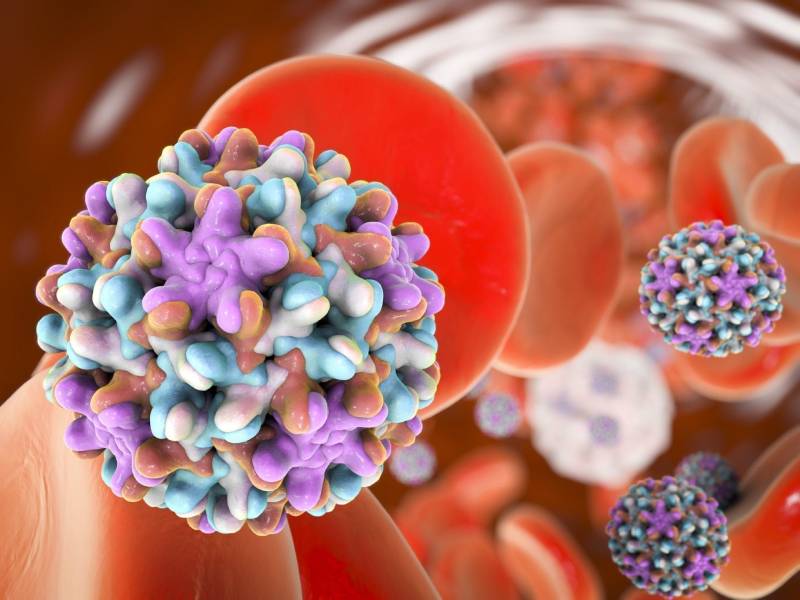What is hepatitis B?
Hepatitis B is a serious liver infection that causes inflammation (swelling and reddening of the liver) that can lead to liver damage. This swelling and damage can affect how well your liver functions. Hepatitis B, also called HBV and Hep B, can cause cirrhosis (hardening or scarring), liver cancer, and even death. A person can have HBV and transmit the virus to others without knowing that they have it. Dr. Manoj Dongare provides the best Hepatitis B treatment in Pune. He is the best liver specialist doctor in Pune.

What are the signs and symptoms of Hepatitis B?
Signs and symptoms of hepatitis B range from mild to severe. They usually appear about one to four months after you’ve been infected, although you could see them as early as two weeks post-infection. Some people, usually young children, may not have any symptoms. Hepatitis B signs and symptoms may include:
- Abdominal pain
- Dark urine
- Fever
- Joint pain
- Loss of appetite
- Nausea and vomiting
- Weakness and fatigue
- Yellowing of your skin and the whites of your eyes (jaundice)
If you notice any of the symptoms, you must visit a liver Specialist doctor in Pune at the earliest. The fastest assessment and subsequent treatment will help you combat this medical condition and live a better life.
How Hepatitis B Transmitted?
HBV is transmissible when blood, semen, or another bodily fluid from a person with the virus enters the body of an individual who does not have it. More specifically, the infection can occur:
- when a woman with HBV gives birth
- during sexual activity
- as a result of sharing needles, syringes, or other drug-injection devices
- as a result of practicing unsafe tattoo techniques
- by sharing personal hygiene items, such as razors and toothbrushes
What are the risk factors for getting hepatitis B?
Due to the way that hepatitis B spreads, people most at risk for getting infected include:
- Children whose mothers have been infected with hepatitis B.
- Children who have been adopted from countries with high rates of hepatitis B infection.
- People who have unprotected sex and/or have been diagnosed with a sexually transmitted infection.
- People who live with or work in an institutional setting, such as prisons or group homes.
- Healthcare providers and first responders.
- People who share needles or syringes.
- People who live in close quarters with a person with chronic hepatitis B infection.
- People who are on dialysis.
How is hepatitis B diagnosed?
There are three main ways to diagnose HBV infection. They include:
- Blood tests: Tests of the blood serum (or plasma) shows how your body’s immune system is responding to the virus. A blood test can also tell you if you are immune to HBV.
- Abdominal ultrasound and elastography: An ultrasound uses sound waves to show the size and shape of your liver and how well the blood flows through it. It also tells about the firmness of the liver.
- Liver biopsy: A small sample of your liver tissue is removed with the help of a small needle and sent to a lab for analysis.
How is hepatitis B treated?
Your doctor will treat you based on what type of hepatitis B you have, acute or chronic.
- Acute hepatitis B infections: If you develop an acute (short-lived) form of the condition, you probably won’t need medical treatment. Instead, your doctor will likely suggest that you get plenty of rest, drink lots of fluids and maintain a healthy diet to support your body as it fights off the infection.
- Chronic hepatitis B infections: If you have chronic hepatitis B, you might be a candidate for drug therapy. Usually, drug therapy is used only if you have active liver disease. Two are injectable forms of interferon, while the five other antivirals are tablets.
You will need to take these medications every day. They help by slowing the virus’s ability to multiply in your system. This helps reduce swelling and liver damage. You’ll need to be regularly monitored for early signs of liver damage and liver cancer. Your healthcare provider will want to see you once or twice a year.
How is Hepatitis B Prevented?
Testing & Vaccination
- The hepatitis B vaccine offers excellent protection against HBV. The vaccine is safe and highly effective. Vaccination consists of 3 doses of vaccine (shots) over the course at 0, 1, and 6 months. Protection lasts for 20 years to life.
- If you have one or more risk factors for hepatitis B infection, you should get a simple HBV blood test. The blood test will determine whether you are:
- immune to hepatitis B; or
- susceptible to hepatitis B and need vaccination; or
- infected with hepatitis B and need further evaluation by a physician
What is the cost of hepatitis B Treatment in Pune?
The cost of Hepatitis B treatment in Pune may depend upon the following factor
Type of treatment recommended by Liver Cancer Surgeon
- Duration of hospitalization
- Room category
- Additional medical tests, if required
- Expense for medications
- Government Scheme (If Applicable)
Book an Appointment:
Dr. Manoj Dongare at Dr. D. Y. Patil Hospital and Research Center provides one of the best Liver treatment and transplant services in Pimpri Chinchwad and Pune. For more information about our comprehensive treatment options, or to request an appointment with one of the best Surgical Liver Transplant and HPB Surgeon in Pune call 09881379573 or Click on Book Appointment for online booking with your near hospital.
